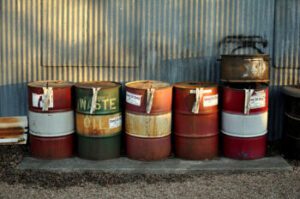Automotive Shops and Used Oil Waste: FAQs
December 18, 2014
If you manage an automotive repair facility or maintenance shop, you may have some questions concerning the safe disposal of used oil, used oil filters, contaminated fluids, and other waste streams that are generated in your shop day-to-day.
A few of these questions might be:
- What does the EPA define as “used oil”?
- What is a universal waste?
- Does my automotive shop qualify as a Small Quantity Generator (SQG)?
- Are all of my petroleum-based throwaways considered “hazardous” waste by the EPA?
- Am I following the correct guidelines on the storage of these wastes?
- What can I do with my used oil products?
Never worry, we have compiled this primer to answer your questions.
- What is the EPA’s definition of used oil?
According the Resource Recovery and Conservation Act (RCRA), “used oil must be derived from crude or synthetic oil; be used as a lubricant, coolant, heat transfer or hydraulic fluid, or similar uses; and be contaminated through use.”
- What is a universal waste?
Universal wastes are wastes that are exempted from hazardous waste status. The most common wastes that are generated by automotive shops are used oil, gasoline, antifreeze, and mercury switches, and all four are considered universal wastes, meaning they do not count toward hazardous waste generator status. The Environmental Protection Agency (EPA), in a 1995 ruling, has stated that universal wastes are exempt from the sometimes tough regulations on the storage, treatment, disposal, handling, and transportation of hazardous wastes.
- What is a Small Quantity Generator (SQG) as it relates to automotive shop waste?
A Small Quantity Generator (SQG) is any person, company, or facility that generates more than 220 pounds, but less than 2,200 pounds, of hazardous waste per calendar month. Universal wastes, as mentioned before, are not to be included in your calculation of generator status by waste weight. If you do find out that your company is considered a SQG, you will have to sign up for an EPA ID number. You may find more information on the process here.
- Does the EPA consider used oil hazardous waste?
No. Used oil itself is not deemed a listed hazardous waste by the EPA. It only becomes hazardous by the EPA’s standards if it is mixed with a hazardous waste, of if it displays one of the four characteristics of hazardous waste (ignitability, corrosivity, reactivity, or toxicity).
- What are the storage guidelines on used oil waste?
You may store your used oil in above-ground tanks or containers if it is in good condition. You also need not worry about EPA ID numbers (if you are storing quantities less than 220 pounds per month) or RCRA record-keeping, as with other kinds of waste.
- How can used oil be re-used or recycled?
The recycling presumption of the EPA states that, unless a generator is to dispose of the used oil, or send their used oil for disposal, it is presumed that this used oil waste will be recycled. There are many ways you can recycle oil waste, by simply reusing it on-site, sending it off to a refinery to be cleansed and repurposed into new oil, or by burning it for fuel. However, you should never mix oil and gasoline together, as the resulting fluid cannot be legally recycled.
You’d also be doing the environment (and our dependence on imported oil) by refining your used oil waste—as just one gallon of used motor oil can provide the same 2.5 quarts of lubricating oil (used in many types of machinery) as 42 gallons of crude. Used oil can become a virulent contaminant if it comes into contact with water or soil.
Used oil is not only generated in the automotive industry. Do-it-yourself oil-changers also have to deal with this kind of waste. The EPA estimates if all the oil from these oil changes were recycled, enough oil for 50 million cars would be saved.
Photo credit: Scott Miller via compfight


